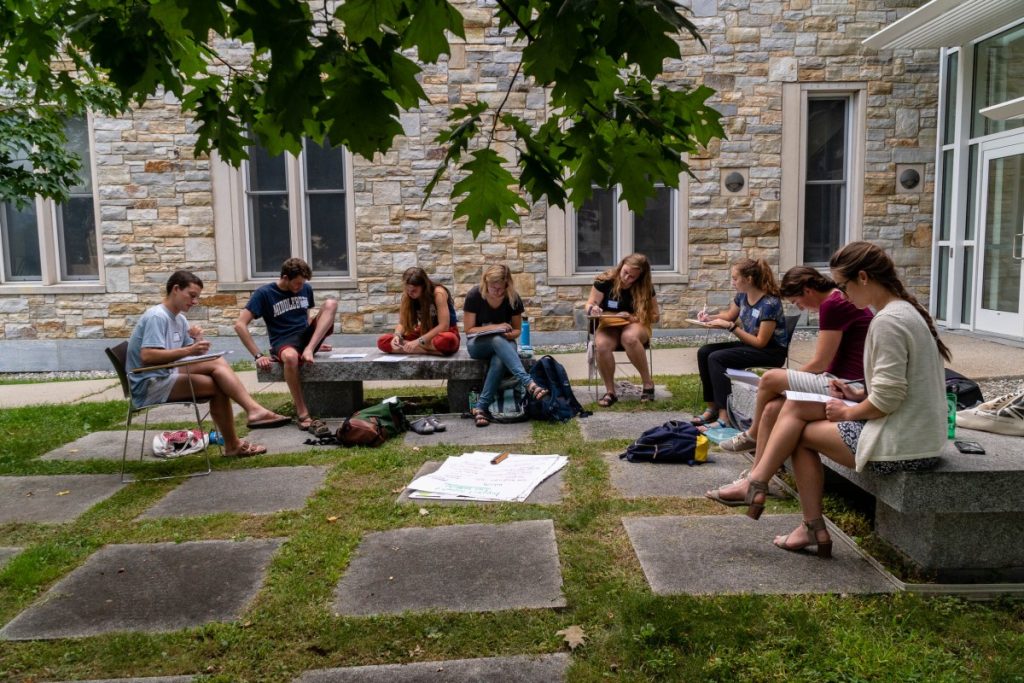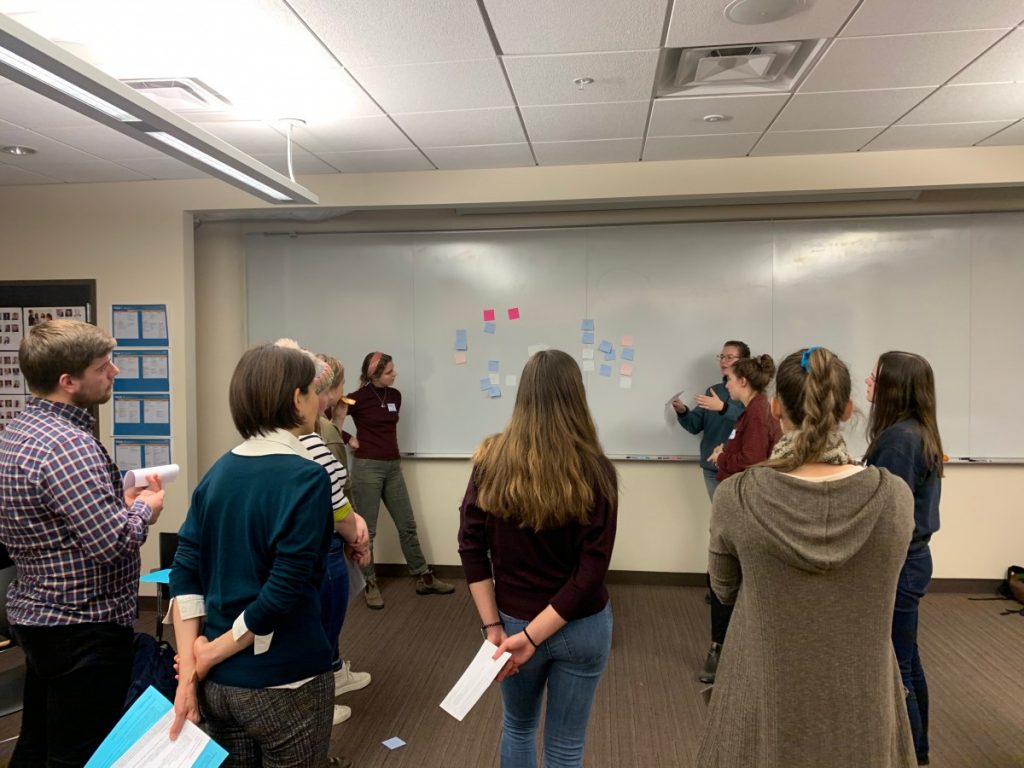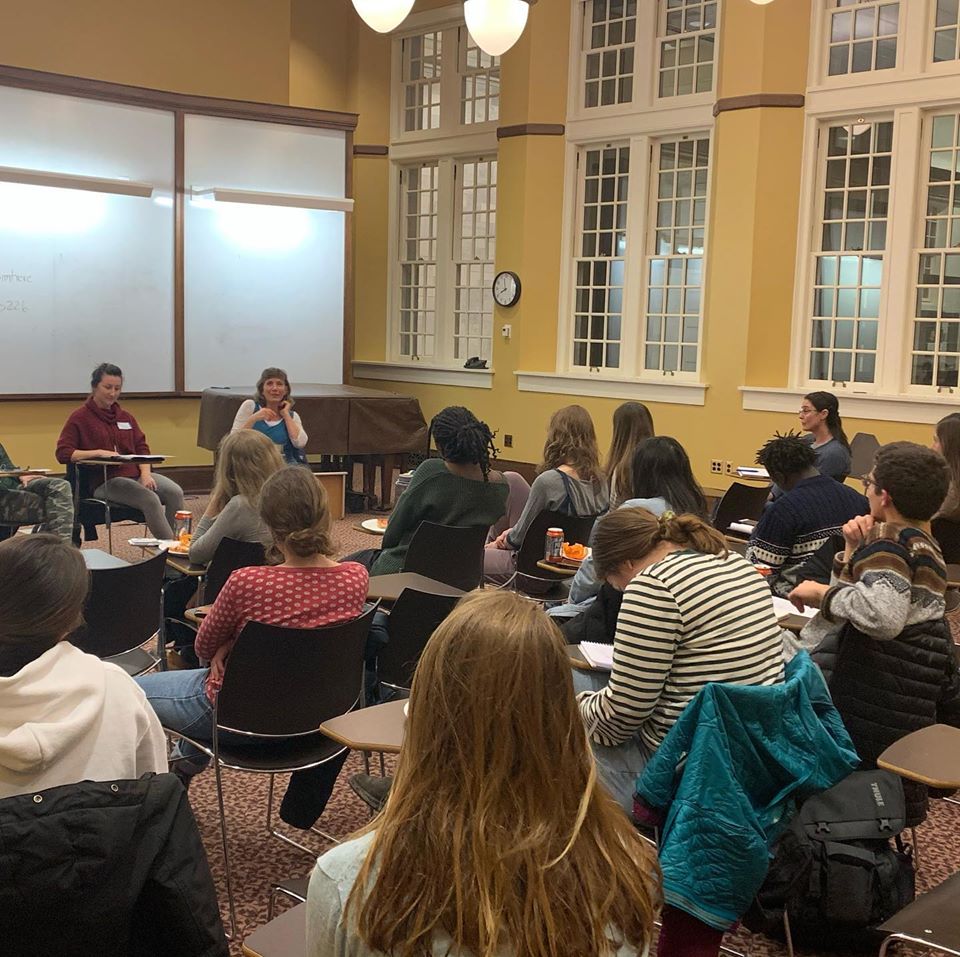Through the CCE’s Service Cluster Board (SCB) trainings, Civic Leadership Certificate (CLC) cohort, and civic skill building Winter Term Workshop (WTW), students in Middlebury College’s 17 student service organizations develop their leadership knowledge and capacities. These experiences complement their community-based experiences, helping them to become effective leaders and change agents during their time at Midd and beyond.
During monthly SCB trainings, two student leaders from each organization learn resources for organizational and leadership development, such as how to manage conflict or practice inclusive member recruitment. CLC cohort members amplify this learning with additional reflections and workshops that allow them to connect with other passionate leaders, design cohesion across their service and learning experiences, and focus on social-issue-specific areas of their choosing.
Here are two examples of the kinds of trainings we’ve supported in 2020 so far!
Generating Civic Skill Building Workshops
As the first Winter Term Workshop (WTW) of its kind, Generating Civic Skill Building Workshops equipped students with tools to become effective facilitators of skill-building workshops for their peers. Five students participated in this workshop, each with connections to one or many Service Cluster Board organizations and several as members of the Civic Leadership Certificate cohort: Zeke Hodkin ’21 (MiddVote), Sophia Johnson ’22 (WildMidd and CLC), Viv Merril ‘22.5 (WildMidd and CLC),
Gardner Olson ’22 (Community Friends and CLC), and Chloe Zinn ’22 (DREAM).

During the first three weeks of J-Term, these five students worked together to select civic skills that intrigued them and then co-designed interactive workshops around them to build that skill with others. With facilitation from CCE Assistant Director Kailee Brickner-McDonald and CCE AmeriCorps VISTA member Ellie Dickerson ’19, participants dove into resources on their selected civic skills and learned principles of designing quality curricula and practices of effective workshop facilitation.
Participants then had the opportunity to facilitate their workshops to leaders of all Service Cluster Board organizations, such as Brother to Brother, Butch’s Team, Juntos, MAlt, and NOM. Their three, 40-minute long workshops addressed Leadership Styles, Project Management, and Coordinated Leadership as part of the SCB training in the final week of J-Term. SCB members attending the workshops appreciated the “change of pace” in having student-led presentations, finding it both exciting and refreshing.

Students were able to acquire useful skills not just by attending the workshops but by being a part of the process of creating such workshops. As Kailee Brickner-McDonald explains, “Two of the best ways to deepen understanding of a skill is to practice it and teach it to others. Between the Winter Term Workshop on workshop facilitation and the facilitation experience itself on a particular skillset, our participants got to do both.”
Participating in the Winter Term Workshop helped students to recognize their strengths and weaknesses, allowing them to build on their personal leadership strengths and styles while also gaining skills and confidence in areas they didn’t feel so strong in, such as facilitation. One participant stated: “My comfort guiding a workshop (especially one with my peers present) grew exponentially through this WTW and final facilitation exercise… [the CCE staff] encouraged us to think with so much advance attention to necessary items, time constraints, and approach to the materials. I feel like my skill-set for learning and teaching grew widely in this WTW.”
My comfort guiding a workshop (especially one with my peers present) grew exponentially through this WTW and final facilitation exercise.
Generating Civic Skill Building Workshops Participant
The experience taught DREAM Co-Chair Chloe Zinn ’22 that empathy and intention are just as important as quality curricula in creating effective educational presentations. She stated: “I learned that it takes effort and care to truly get through to an audience, and even more challenging workshops can be facilitated well with intention and genuine empathy.”
I learned that it takes effort and care to truly get through to an audience, and even more challenging workshops can be facilitated well with intention and genuine empathy.”
Chloe Zinn ’22, DREAM Student Leader and Generating Civic Skill Building Workshops Participant
Social Issue Panels to Dive Deeper
In addition to building students’ civic leadership skills, the Service Cluster Board and Civic Leadership Certificate programs also enhance students’ ability to support their community partners and connect their experiential learning with their academic understanding of social issues. Sixty-seven organization leaders and members came together on Wednesday, February 26 to learn from two sets of community partner, alumni, and faculty panelists who discussed the topics: Engaging with Youth and Mentoring and Accessing Addison County’s Resources. Consisting of three experts each, the panels sought to deepen students’ understanding of social issues and local contexts to better support their personal and/or organizational work in the community. Students submitted their questions in advance, leading to interactive and insightful conversations in both panels. Ellie Dickerson ’19 (CCE AmeriCorps VISTA) developed and coordinated the event.
Engaging with Youth & Mentoring panelists included Laura Basili, a Middlebury College Visiting Faculty member and clinical psychologist whose therapeutic work focuses on children and adolescents living with adversity, illness, and loss; Mel Hurlburt, DREAM Program Director; and Elizabeth Burrows, an Addison Central School District counselor with more than 25 years of experience in the field. The panelists addressed critical questions about working with youth who have had adverse childhood experiences, engaging in meaningful conversations about difficult topics, and encouraging healthy behaviors without being overbearing, among others.

Students will be able to apply the wisdom and resources from the panel in their work with community youth, strengthening relationships and enhancing the many socio-emotional, cognitive, and identity development benefits of mentorship. Speaking to those benefits, the panelists served as source of inspiration and reflection for students, reminding them why they became mentors in the first place. In the words of one student: “I loved having them here…it reminded me that what I’m doing is important and refreshed the patience I have with my mentee.”
I loved having [the panelists] here…it reminded me that what I’m doing is important and refreshed the patience I have with my mentee.”
Engaging with Youth & Mentoring Panel Particpant
Conversation in the Accessing Addison County’s Resources panel was similarly robust. Leading the panel were HOPE’s Local Food Access Coordinator Lily Bradburn, WomenSafe Services Director Christina Grier, and recent Midd graduate Luna Shen ‘19.5, a current AmeriCorps member at John Graham Shelter in Vergennes. Bringing a range of experiences and expertise, these three panelists offered many insights into Addison County’s most pressing social issues. The panelists’ broad overview of local issues and support networks was especially helpful for the many students who work closely with one or two local organizations but aren’t necessarily aware of other issues or the many ways community partners work together to address them. The panel also allowed for a deep dive into specific issues, such as the affordable housing crisis and the negative effects of state policies on homelessness. One participant noted that they “didn’t realize how transportation…impacted the people that live in Addison County. It’s a really large place geographically, and can be difficult if you don’t have shelter or means of transportation.”
It makes me excited that the SCB helps all student organizations deepen their connection with community, which is the reason I decided to work with the CCE in the first place!
Accessing Addison County’s Resources Panel Participant
Getting out of the Middlebury campus bubble and into the community is one of the primary reasons students get involved in CCE’s programs. As one student remarked, “It makes me excited that the SCB helps all student organizations deepen their connection with the community, which is the reason I decided to work with the CCE in the first place!” The community partner panels complemented their service experiences, deepening their knowledge and ability to engage meaningfully in their respective organizations.
Future SCB and CLC trainings this spring will include Budgeting as Storytelling on March 16th, and Leadership Transitions in April. Thanks to all who deepen their community engagement experiences by participating in our training programs!
